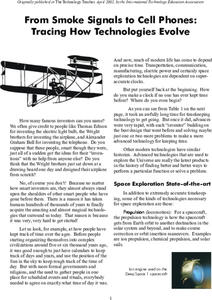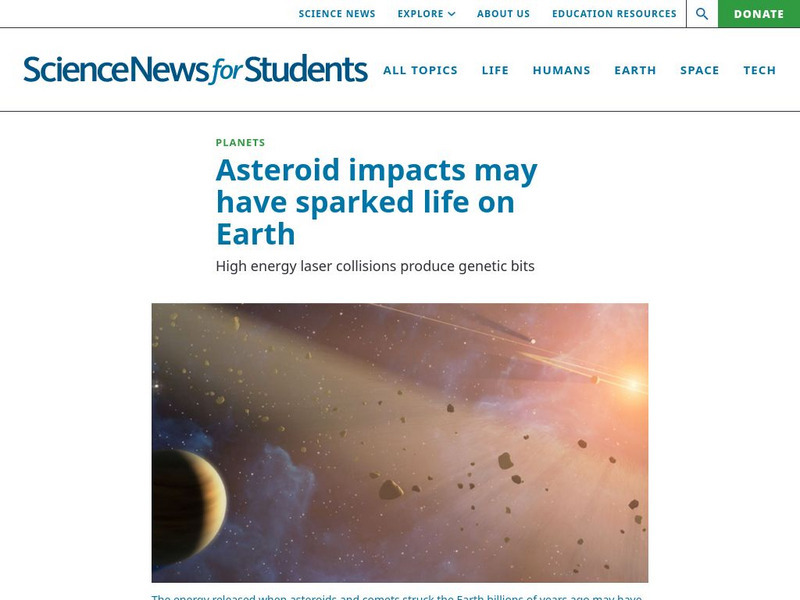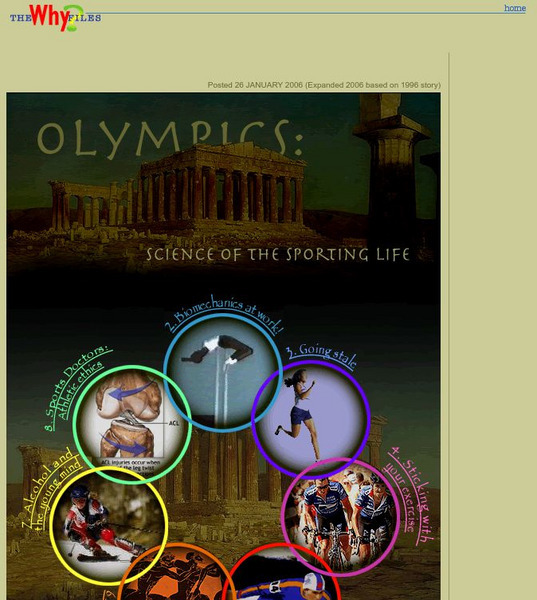NASA
From Smoke Signals to Cell Phones: Tracing How Technologies Evolve
Explore the science of space exploration. Pupils consider technological advances in propulsion, communication, power, navigation, and imaging. They select one of these areas and create a timeline of historical progress that contributed...
NASA
Water Works on a Blue Planet
Keep within a water budget. Learners find out that less than 2.5% of Earth's water is available to drink—and that there is a fixed amount of water. Scholars read an interesting article comparing the available water to a game of Monopoly...
NASA
Blinded by the Light!
Pupils learn of multiple ways astronomers look for planets outside of the solar system. By completing a hands-on activity, scholars discover that trying to see the planets directly because of the glare from the nearby star is nearly...
NASA
Write the Book on Weather Metrics
It's not easy to measure the weather. Pupils learn about what all weather has in common—the atmosphere. Scholars discover how a meteorologists must be able to measure aspects of the atmosphere and decipher the data. They then create a...
Society for Science and the Public
Science News for Students: Ocean Animals Have Mushroomed in Size
Article reports on the increasing size of ocean animals over the millenia. Includes a list of key vocabulary.
Society for Science and the Public
Science News for Students: Asteroid Impacts May Have Sparked Life
Article reports on a new study that claims that the energy released from asteroid collisions may have sparked life on Earth. Includes a list of key vocabulary.
Khan Academy
Khan Academy: Biology: Intro to Biology: What Is Life?
This article explores exactly what is considered alive but reviewing over the characteristics of life.
Open Curriculum
Open Curriculum: Early Life
The aim of this article relates the nature of science to our current understanding of the origin of life and describe the formation of the atoms which build the Earth and its life.
Society for Science and the Public
Science News for Students: Like Poison for Phosphorus
Discusses a research study undertaken at Mono Lake in California, known for its extreme salty conditions, which supports unusual life forms. Scientists found that a bacterium could survive using arsenic instead of phosphorus,...
Society for Science and the Public
Science News for Students: Sleepless at Sea
Can you go for a month without sleeping? Most mammals can't, but scientists have found some marine mammals that do. Find out why some orcas and dolphins don't sleep for weeks at a time.
Story Behind the Science
Story Behind the Science: Search for Life's Origins [Pdf]
Article describing research done by scientists in their quest to understand the origins of life. Questions are posed throughout about the nature of scientific research.
University of Wisconsin
The Why Files: Olympics: Science of the Sporting Life
When the Winter Olympics begin we can study the science of sports: biomechanics, figure skating, high jumping, mental preparation, alcohol and athletes, sports doctors, staleness, and training in the ancient Olympics.
PBS
Pbs Learning Media: Life's Greatest Miracle: Stem Cell Debate
This essay from NOVA: "Life's Greatest Miracle" explores the debate over the use of embryonic stem cells in scientific research.
US Geological Survey
Usgs: North Carolina District Science Plan
The North Carolina District of the Water Resources Discipline, U.S. Geological Survey (USGS), is committed to collecting hydrologic data and conducting hydrologic investigations of the highest quality. North Carolina District staff...
Open Curriculum
Open Curriculum: Energy for Life: An Overview of Photosynthesis
Students will be able to identify the kind of energy which powers life.
Khan Academy
Khan Academy: Discuss: Algorithms in Your Life
Learners are invited to express algorithms in their everyday life, sports, games and apps.
American Museum of Natural History
American Museum of Natural History: Carl Sagan and the Quest for Life in the Universe
A brief biography of American astronomer and science advocate Carl Sagan.
American Association for the Advancement of Science
American Association for Advancement of Science: The Slow Birth of Agriculture
An article which describes the slow process of crop cultivation. The author argues that crop cultivation and village life may not have been connected.
Christian Science Monitor
Christian Science Monitor: What Kids Did on the Western Frontier
An interesting article addressed to students discusses the life of children on the western frontier, about the time of the "Little House" stories of Laura Ingalls Wilder.
Other
Pocket Lint: Life in the Future: Tech That Will Change the Way We Live
Technology has the power to do many things, and changing the world is one of them. We're privileged to be living in a time where science and technology can assist us, make our lives easier, and rethink the ways we go about our daily...
Khan Academy
Khan Academy: Biology: Chemistry of Life: Matter, Elements, and Atoms
Did you know matter is made up of atoms? In this article learn about the smallest unit of matter called the atom.
Khan Academy
Khan Academy: Biology: Chemistry of Life: Atomic Number,atomic Mass,and Isotopes
Learn the fundamental properties of atoms in this article. Understand the definition of atomic number, atomic mass, and isotopes. [6 min, 50 sec]
Khan Academy
Khan Academy: Biology: Chemistry of Life: Chemical Bonds
Review over covalent, hydrogen, and ionic bonding in this article. Learn how molecules are held together by chemical bonds.
Society for Science and the Public
Science News for Students: Motion in the Ocean
This article reports on recent research that explains why corals are in nearly constant motion. Includes a brief video. [0:16]










![Story Behind the Science: Search for Life's Origins [Pdf] Article Story Behind the Science: Search for Life's Origins [Pdf] Article](https://d15y2dacu3jp90.cloudfront.net/images/attachment_defaults/resource/large/FPO-knovation.png)







